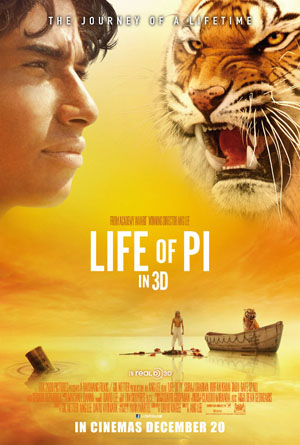Starring Suraj Sharma, Irrfan Khan, Tabu, Adil Hussain, Rafe Spall
Directed by Ang Lee
 Some epic novels should never go into movie adaptations. Majestic magnificent and moving as it is, I am not too sure that Yann Martel’s novel was ever meant to be filmed. Trust the amazing Ang Lee to move into non-cinematic literary material and attempt visual manifestations of what are at most, images of a mind that believes Man is wedded in a holy communion with Nature.
Some epic novels should never go into movie adaptations. Majestic magnificent and moving as it is, I am not too sure that Yann Martel’s novel was ever meant to be filmed. Trust the amazing Ang Lee to move into non-cinematic literary material and attempt visual manifestations of what are at most, images of a mind that believes Man is wedded in a holy communion with Nature.
On the surface Life Of Pi is the story of a young man’s epic journey with a magnificent tiger. A shipwreck(filmed with surprising tameness) snatches our hero Pi’s family away from him. We aren’t allowed to feel the boy’s mammoth sorrow and desolation at the bereavement. It’s really about survival. And well, you really need to quickly find ways to save your skin.
As far as one man’s attempts to overcome the emotional and physical wreckage of a shipwreck goes, the Tom Hanks starrer Castaway provided much more gripping fodder for the senses. Here in Life Of Pi the protagonist’s struggle for survival in the middle of an unheedful ocean is done in a tone that echoes the sound of a well-written work of fiction being read out aloud. Chiselled words render themselves to a staccato visual rendering. Brave and beautiful, Ang Lee’s rendering of Martel’s novel somewhere, one feels, loses something vital and precious in translation.
Some ideas are so vast they are best left to the imagination. Ang Lee takes up the near-impossible task of putting visuals into words that thunder with a theosophical thrust in print but appear lamely lyrical on screen. You know you are meant to be watching a monumental visual treatise on Man’s relationship with Nature, and to some extent the skilful raconteur in Ang Lee manages to hold our attention. But eventually it’s all too scattered and disembodied to be sublime.
The emotional content of the journey is somewhere lost in the vast stretches of oceanic introspection when Pi, lost to the world, slowly painfully but surely finds his own emotional spiritual and physical bearings in the company of the imposing tiger. Spatial harmony is exceptionally well created on the little boat that serves as Pi and his tiger companion’s home for nearly 300 days. The best thing that can be said about the 3D effects is that you hardly notice it.
For me the film worked best as a man-beast story, like Chinappa Devar’s 1971 Bollywood blockbuster Haathi Mere Saathi. The bond that grows between Pi and , well, Richard Parker(that’s what the tiger is named) is charted out in the azure anonymity of the opulent ocean with a sense of growing desperation. Both the boy and beast know they will die, unless a miracle happens soon. That miracle when it happens in the film, is shot in a languorous surrealistic surrounding satiated with gorgeous greenery and innocuous little creatures scampering around in uninterrupted harmony with Nature. Claudio Miranda’s cinematography is wedded to Nature.
For all its spiritual and visual beauty it’s truly challenging to be one with Ang Lee’s treatise on Man and Nature. No matter how you see his interpretation of the cosmic bond between Man and beast, you are at best gazing at some spectacular visuals done in colours and moods that impart a heroic hue to the survival story but do little to convince us of that indelible relationship between destiny and caprice that throws a 19-year old boy into the arms of an infinite isolation nearly year.
Debutant Suraj Sharma plays the shipwrecked hero with a refreshing absence of visible craft. The angst comes from a heart that knows no craft. This is the only performance that works completely. Irrfan Khan as the grownup Pi failed to convince me that he really cared about his character. Maybe we expect too much from him . Maybe he should be a little less blasé on the screen about our expectations. As for he sublime Tabu she has virtually nothing to do in the film and she does it nonchalantly.
Funny how artistes of impeccable calibre from India agree to become glorified junior artistes in prestigious international projects.
Life Of Pi is an unfinished masterpiece. It touches on existential issues while taking our hero on a voyage that changes his life. But we never penetrate Pi’s polemical heart, bursting at the seams with ideas on the one-ness of God. Pi’s childhood days in Puducherry are weakly conceived. His private zoo is a visual treat. But really, we can’t wait for him to take off on his voyage of self-discovery.
Pre-voyage, Pi’s dinnertable discussions with his practical father(Adil Hussain, struggling to give space to his underwritten part), ‘poetic’ mother(Tabu) and an elder brother are surprisingly bereft of genuine warmth. This, from the director of such overpowering emotional dramas as Couching Tiger Hidden Dragon and Brokeback Mountain, is an indication of how unfilmable this material is. Also, Pi’s early school-says montages are prosaic. Do we really care that much about how he got his strange name?
Towards the end when Pi has survived the ordeal there’s a lengthy monologue where Pi tries to create an alternate reality for two disbelieving Japanese insurance agents, about the incredible experiences he has gone through. As actor Suraj Sharma struggles valiantly to put into words visuals that are predominantly frozen in the real of the imagination, you know what ails this fractured neo-classic.
Life Of Pi takes on the daunting task of putting visuals to thoughts too profound for manifestation. It’s a majestic mirage, a lyrical illusion, a celebration of existential ambivalence. It is that slice of cinema that bedazzles, beguiles and bewilders the senses. At the core it is the story of a boy and a tiger thrown together in adversity, told with a sweeping panache that is at times, breathless as it is breathtaking.
Though Life Of Pi finally leaves you underwhelmed, one thing is for sure. This is a journey no one is likely to forget.











